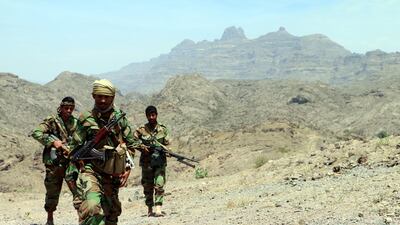Yemen's Human Rights Minister has urged the United Nations to intensify its humanitarian intervention in the southern province of Al Dhalea after a series of intensive attacks on populated areas by Houthi rebels.
Thousands of civilians from the areas of Hajer and Mureis in Qatabah district and Al Azarik have been displaced over the last two months and are running low on food and other supplies.
Minister Mohammed Asker told The National on Tuesday that international organisations must intervene in the province to save thousands of lives that urgently need assistance.
The Houthis are hoping to gain another victory in the provinces surrounding the capital Sanaa as they continue to target civilian homes in the Habeel Al Souk village, in the Hajer district, using mortar and Katyusha rockets.
“We struggled to stay home, so we fled, especially after the Houthi shelling damaged our house,” said Umm Ahmed, a mother of eight, as she fled to safety.
The province has no displacement camps so civilians leaving their homes have been staying at schools or in abandoned houses, said Fuad Gubari, an independent journalist covering the fight in the province.
Al Dhalea, situated between Aden and Sanaa, is symbolically important to government troops because it was the first region they liberated from the Houthis after the coup in 2014.
“Although the Houthis were driven out of the Baja village, which contains water supplies for 80 per cent of the populated areas in Al Dhalea, the rebels still had some control over the northern part of the village,” said Mr Gubari.
“It enabled them to continue their siege over the water wells."
Government representatives have urged the head of a UN team that is monitoring a ceasefire in the Red Sea city of Hodeidah to review an earlier announcement that Houthi rebels have withdrawn their fighters from the ports of Hodeidah, Al Saleef and Ras Isa.
The withdrawal was part of a ceasefire agreement that requires all forces to pull out of Hodeidah and for the ports to be placed under UN supervision.
The government believes the rebels have handed control of the port to forces loyal to them, and that the UN has turned a blind eye.
“Government representatives explained to Lt Gen Michael Anker Lollesgaard (head of the United Nations Mission in support of the Hodeidah Agreement) that only a unilateral withdrawal was implemented by the Houthis,” said Col Wathah Al Dubaish, spokesman of the joint government forces in Hodeidah.
“The withdrawal procedures from Hodeidah must be in accordance with the Stockholm agreement."
The Stockholm Agreement was signed on December 13, 2018, providing a conduit for aid through Hodeidah, the demilitarization of Taez and an exchange of prisoners.
Lt Gen Lollesgaard is handling the local negotiations between Houthi and government representatives.
Hodeidah is the main entry point for Yemen’s import and aid and a source of revenue for the Iran-backed rebels.

